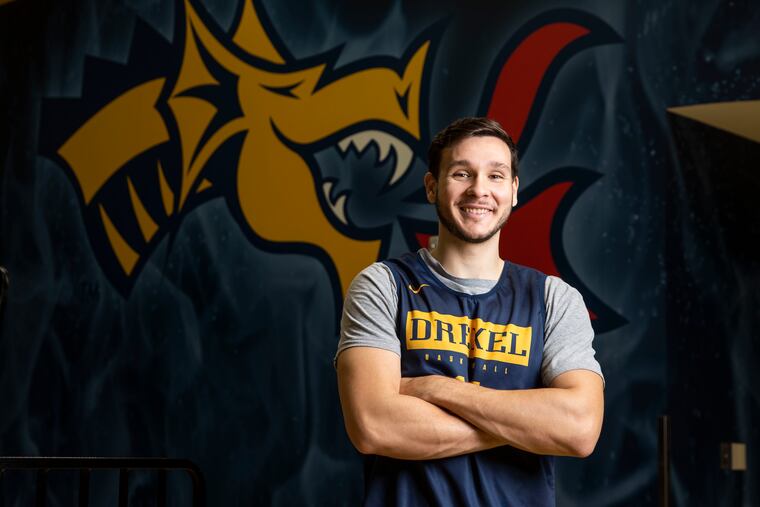Matey Juric prepares for medical career as a team leader for Drexel
As an injured athlete at times, Juric got a "sense of comfort" from doctors, which ignited his drive to go into medicine.

Whether it’s the synchronous movements of players on the basketball court or the movement of cells within the body, Matey Juric is a bit of an authority.
When he’s not on the court running plays as a senior guard at Drexel, Juric is a premed student learning about the movement of cells, specifically working with glioblastoma, an aggressive type of brain cancer. His passion for medicine is rooted in his athletic background.
“Being an athlete my whole life, I’ve usually dealt with a lot of injuries, and over the years I realized that a doctor was always there for me,” said Juric, who is applying to medical schools. “They cared for me and they gave me a sense of comfort, which inspired me because I wanted to be that for other people.
“I want to advocate for them when things aren’t going their way health-wise, so that’s the initial spark that intrigued me to want to get into premed.”
Juric started working as a volunteer this fall in Drexel professor Ryan Petrie’s research lab. Petrie has been a professor at Drexel since 2015 and teaches advanced cell biology, and cell, molecular and developmental biology.
“We’re trying to understand what type of proteins are involved and how they impact cells moving around in the body,” Juric said. “Then we relate that to cancer and seeing how cancer spreads in the brain.”
Petrie remembers one of the first things that stood out about Juric was their similar background growing up around Toronto.
“I initially got to know Matey through his coursework and exams,” Petrie said. “He was one of the top students in the class. I was very happy to learn about his interest in cell biology and my lab in particular and was keen to give him an opportunity.
“First impression was that he was a relatively soft-spoken student who was excellent and interested in learning more about cell biology.”
Juric has also had three articles published in CardioSmart, a program affiliated with the American College of Cardiology. The purpose of CardioSmart is to serve as an outreach of science information provided to the general population to bring a better understanding.
“Two other cardiologists, Roger S. Blumental and Martha Gulati, have helped tremendously throughout the whole process,” Juric said. “They would either meet with me with an idea or I would come to them with an idea. We would bounce back some articles that are being published or some data that they have, and from that point I kind of did my own thing.
“I would try to put together an article that I thought would be useful for the general population.”
His published articles were titled “Omega-3 Fatty Acids Show Promise in Lowering Risks of Atherosclerotic”; “Hispanic/Latino Patients With Peripheral Artery Disease Underuse Heart Medications”; and his most recent, “The Risk of Heart Inflammation in College Athletes.”
The latter was published right as the college basketball season was about to begin in 2020.
“A lot of conferences were debating canceling the season because they were scared that people that contract COVID-19 would have a higher risk of getting myocarditis,” Juric said. ”So I did some more research on different articles and one article showed that there was an increase, but it was in an older demographic and all the people tested were from Germany, so it didn’t really correlate with student-athletes in America.
» READ MORE: Drexel’s mental performance coach helps soccer players find a balance
“I wasn’t giving my own opinion, just providing the information so people know what’s going on.”
Juric was excited to go back to play last season but was uneasy leaving his family back in Canada. The team finished 12-8 and 4-5 in the Colonial Athletic Association but won the conference tournament to qualify for the NCAA Tournament.
Juric was Drexel’s defensive player of the year the last three seasons.
As an undersize player, the 5-foot-11 Juric feels the need to prove himself on the court, and he values the fundamentals, such as free-throw shooting.
“They’re extremely important,” said Juric, who is a career .767 free-throw shooter. “In the last couple games of the conference tournament where we were in the bonus, a lot of teams were just trying to foul to get back into the game.
“So if I don’t make the free throws and if my team doesn’t make the free throws, then it gives a chance for the other team to get back in it. That just shows the importance of the simple things.”
Juric is already getting a head start on becoming a “sense of comfort” for his future patients, as he looks to play that same role for the younger players on the team. As a senior, Juric believes he has a lot to offer them.
» READ MORE: Netherlands field hockey legacy thriving at Drexel and throughout City 6
“It can be a lot for an incoming freshman or transfer student because things were run differently at their previous school,” Juric said. “So being there, encouraging them, and letting them know that it’s OK to mess up. I want to be there for them and help them out in any way I can.”
Juric is excited for the return to play with the season opener Tuesday at home against Neumann.
“I’m just looking forward to competing once again with my team,” Juric said. “And running it back to the March Madness tournament.”